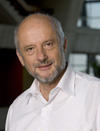A week of reviews
 |
| Pier Oddone |
Last week two very important review committees came to the laboratory. Their respective meetings spanned the full week. Steve Holmes, who played important roles in both reviews, spent five solid days in the Comitium!
The first review was by the Muon Technical Advisory Committee (MUTAC), chaired by David Rubin of Cornell University. The committee reports to the laboratory directors of Fermilab, Brookhaven National Laboratory and Lawrence Berkeley National Laboratory on the progress and plans for a multi-TeV muon collider as developed by the The Neutrino Factory and Muon Collider Collaboration (NFMCC) and the Muon Collider Task Force (MCTF). While there is general agreement that discoveries at the LHC will require the development of a lepton collider, we will not know the energy of such a collider until we learn new physics from the LHC. By far, the most straightforward collider to follow the LHC discoveries would be the ILC, provided most of the important physics lies below one TeV. If the LHC shows us that substantial physics lies above one TeV, we will need an affordable new technology for a multi-TeV lepton collider. This will take time to develop.
Beyond our strong R&D program on the ILC, to prepare for the possibility that we may need a higher energy collider, we at Fermilab are carrying out an R&D program on the muon collider with MCTF and NFMCC. CERN is pursuing a compact linear collider, CLIC, which uses very high-current beams to drive high energy e+ e- beams (using the "two beam" accelerator concept).
The MUTAC felt that progress in the last year was impressive. It also emphasized the need to ramp up the R&D to reach a plausible paper design by 2012-13. Equally important, it recommended we narrow down some of the technical options soon. This will be a hard thing to do for a collaboration that has been creative, coming up with many new ideas. A design by 2012-2013 would allow a set of technical demonstrations of the cooling systems before the end of the decade, a time when a complete design and cost would be ready for consideration.
The second review of the week was by the FRA Science Visiting Committee, set up by the board of directors of FRA to review our scientific program and plans. This year's review focused primarily on the research programs at the intensity and cosmic frontiers. Our programs will emerge stronger because distinguished scientists in the community look at our activities with fresh eyes, evaluate our strategy as we move into the future and advise us on improvements and course corrections. The committee under the chairmanship of Professor Marjorie Shapiro of LBNL kicked the tires hard and found them in very good shape, a credit to all our staff.
We are very appreciative of the effort and energy invested in the reviews by our distinguished colleagues on these committees. We value their advice greatly.
|